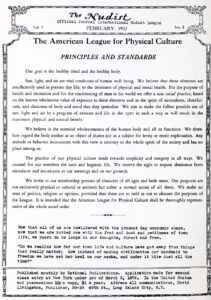Presented below are the principles and standards of The American League for Physical Culture (ALFPC) as published in 1932. Founded by nudist pioneer Kurt Barthel, the ALFPC was the first organization of its kind in the United States, and this document is probably the first formalized statement of nudist ethics in the country. Its core idea, which should come as no surprise, is that nudism is healthy for the mind and body. We discuss this concept often here, and it is as relevant today as it was then. The statement also makes a moral comment citing that the body is not an object of shame nor a subject for levity or erotic exploitation. It views this practice as not just physical, cultural or aesthetic but a union of all three and invites participation by people of good character representing the whole of society.
Our last post also presented a statement of nudist ethics and values, the American Sunbathing Association (ASA) resolution of 1948, passed 16 years after this statement below. Comparing the two is interesting because the ASA document appears to build upon and evolve from the foundation laid out by the ALFPC. Both are products of their time, one coming during the Great Depression and the other in the aftermath of WWII. Both present core nudist values. But whereas the ALFPC statement comes from a perspective of Health (including moral health), the ASA document grounds itself in Morality. It states that the ideals of Nudism are not merely concerned with the physical (health) but also the moral, intellectual and political effort to build a brotherhood of man. It is a document with big ideas that reflect the ambitions of an institution on the right track. What becomes clear is that the nudist pioneers’ views changed and evolved in the years following the Movement’s founding. Gaining the experience of nudist life affected them internally in a philosophical way and externally as they weathered the fight for legitimacy in clothed society.
So, we add this piece to our historical understanding of nudist culture and how its ethos developed. Both the ALFPC and ASA perspectives have their merits, as do today’s more recreational attitudes.
